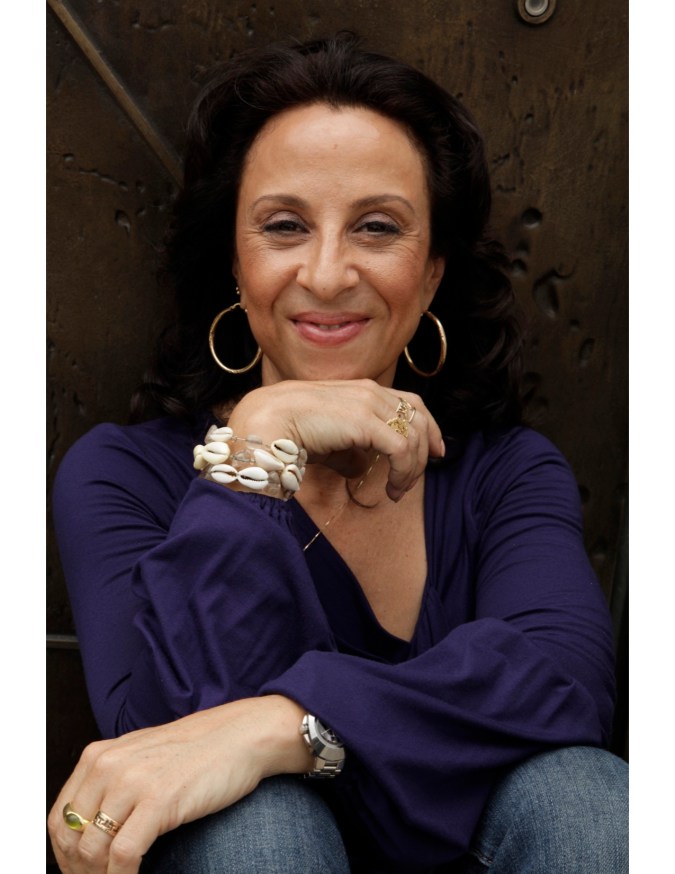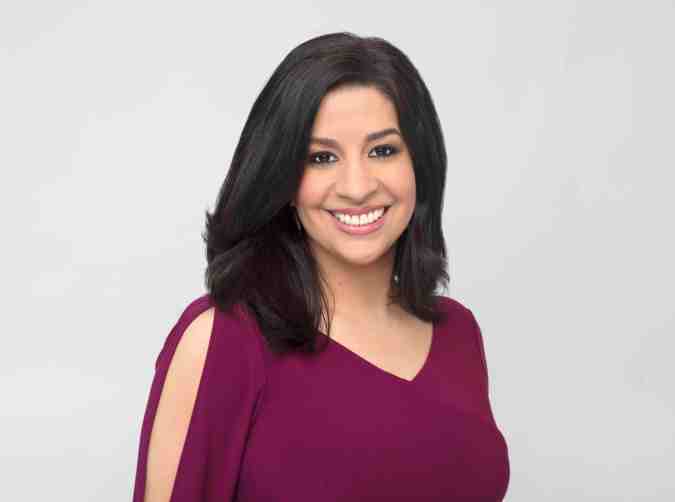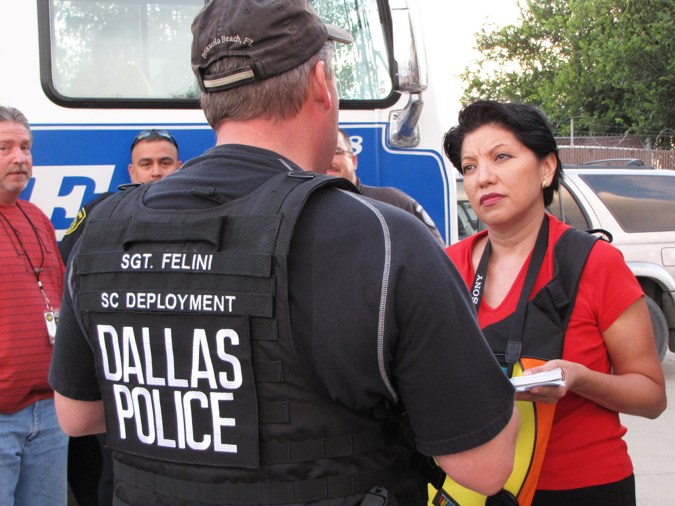The best kind of journalism offers varied perspectives that bring readers closer to an authentic portrait of a given time and place. But despite the premium placed on diverse narratives, newsrooms still can’t crack their own problems of representation, particularly among journalists of color. The workforce remains woefully homogenous, and the numbers are particularly abysmal when it comes to Latinas: The 2017 ASNE, Google News Lab Diversity Survey found that Latinas fill just 2.47 percent of US newspaper newsrooms, and only 8.7 percent of the English-language television workforce.
Filling our ranks in the world of media isn’t an easy task, but it helps to have paths to follow and examples in women who share our experiences and backgrounds. Remezcla spoke to Ilia Calderón, Maria Hinojosa, Tanzina Vega and Rebecca Aguilar – four trailblazing Latinas in the industry. They each discussed their careers and shared their advice for fellow Latinas who want to make it in the field.

Ilia Calderón
Last year, Ilia Calderón took a crew from Noticiero Univision into the home of an “imperial wizard” from the KKK-affiliated group Loyal White Knights. The cameras rolled while he launched into a stream of insults, calling Calderón “a mongrel” and threatening to burn her out, along with the country’s 11 million undocumented immigrants. “I was sitting there representing everything he hates – Latinos, black people, immigrants,” Calderón remembers. But she never flinched; instead, she looked him straight in the eye and challenged him, offering the world a master class in defiance, self-possession, and dominance.
Calderón’s composure and authoritative voice have steered her through a career she’s shown interest in since childhood. Growing up in Colombia’s coastal region of Choco, she would sit with her grandfather, who ran a paper supply store that sold newspapers, and go through different articles with him. While pursuing social work in college, Calderón reported at local networks in Medellin, where she landed full-time work and eventually worked up the ranks, becoming the first Afro-Latina news anchor in Colombia.

She would take on Telemundo and Univision, eventually making history as the latter network’s first Afro-Latina anchor. For Calderón, this is more than a personal achievement: “More than seeing it as a success for me, I see it as a chance to open doors for other women like me. When other young women and girls turn on Univision, [I hope] they’ll identify with what they see on the screen and they’ll feel like they can do this one day, too. This is a chance to open the door – and keep it open.”
“We have to knock on doors as hard as possible. There are some doors that don’t open because we didn’t hit them hard enough.”
Never Stop Knocking
“We’re not going to achieve anything by sitting around and not trying. We have to knock on doors as hard as possible. There are some doors that don’t open because we didn’t hit them hard enough – and we need to keep knocking, even if we’ve done it hundreds of times and even if it’s hard. We can’t get tired. Always, always keep pounding, until they open.”
Own Our Stories
“We have to keep Latinas in this profession because we’re the ones that need to tell our stories. There is no one else who can do it better than us – we’re the ones who have lived these realities. No one knows our culture, our people, our situations, what we’ve suffered, what we’ve lost, what we’ve gained. So it’s important that we foster young journalists and keep building our presence both in the United States and in Latin America, and that the stories that other cultures are hearing about us come from us.”

Maria Hinojosa
To some, Maria Hinojosa has become the official narrator of the Latin American experience in the United States. As the host of NPR’s Latino USA, Hinojosa has tackled the endless facets of Latinidad, sharing stories of vast Latinx experiences with her specific brand of sharp-eyed observation and stirring sense of empathy. “I call it the @Maria_Hinojosa phenomenon,” one Twitter user once wrote about her. “When she cries on a @LatinoUSA episode, listeners do, too.”
But as a young Mexican growing up in the Southside of Chicago, journalism didn’t seem like an obvious career trajectory, especially because Hinojosa didn’t see her own experiences covered in media. “My parents taught us that journalism — the first amendment, freedom of speech — were essential to who we are as Americans,” she says. “But even though I knew that, I never saw myself in any of the stories or the reporting that was happening.” So as a young student, Hinojosa started telling the stories she wanted to see about her community on a college radio show. That led to an internship at NPR, where Hinojosa eventually became the first Latina reporter.
Hinojosa’s work, both on Latino USA and as the co-host of the political podcast In The Thick, constantly pushes for more voices – something she urges more media organizations to champion. “This is not an emotional argument – it is a core argument. American journalism is not doing its best job if it’s not painting a picture of who we truly are as a country,” she says. “And diversity in the newsroom does not mean just one. We need our newsrooms filled with people of color, children of immigrants, immigrants themselves so that people understand the complexity of our experiences.”
“American journalism is not doing its best job if it’s not painting a picture of who we truly are as a country.”
Remember The Value Of Our Perspective
“We have to go over the top sometimes to convince ourselves that we have a right to speak and own this journalistic endeavor, because being invisible and being a target so often can make you feel less than. But we have to tell ourselves, ‘No, no. My story is important. I know it sounds different, but I haven’t heard anyone tell this story. This has value.’ And we have to put this in the context of the power that Latinas have in our country. You don’t always have big headlines that say, ‘Latinas are the bad-ass consumers, political activists, stars, and future leaders of the U.S.’ Yet, that’s what we’re seeing with Emma González, Edna Chavez, America Ferrera, and so many women in our community. Let’s put ourselves within that context always, and know that we have voice.”
Become “La Reina Que No Se Rinde”
“We have to become the queens of never giving up – las reinas que no se rinden in the world of journalism, the Latinas of American journalism who understand this job is much more than seeing your byline in a paper or your face on the television. This is historic, responsible, civic duty kind of work. The practical thing to do is to form a team of people you can turn to when it gets rough, because it will, and it’s going to help you stay in this business – and that’s what we need.”

Tanzina Vega
A sociological approach to understanding the world has always guided Tanzina Vega, a journalism veteran known for her nuanced reporting around race, culture, class, and the media. “‘How did we get here?’ is the big question I’m always trying to answer in the work that I do,” Vega tells Remezcla. She’s asked this at CNNMoney, where she worked as a national reporter for race and inequality in America, and at The New York Times, where she created and covered the paper’s beat on race and ethnicity for the national desk while also reporting for both the business desk and metro sections.
Vega, a Puerto Rican who grew up in Manhattan public housing, finds that the themes she studied and interrogated as a sociology major in college and later as a reporter continue to evolve and play a central role in her work. In fact, Vega is working on UPPITY: Women, Race and Class in America, a book that examines the social and economic challenges women of color encounter in the professional world, which will be published by Nation Books in 2019. “I don’t think it’s either/or—it’s not class or race; it’s often both, and those two things are linked in the United States at the median and reveal a class differential that can go against the ideas of meritocracy in this country,” Vega said.
Next, she’ll be turning her lens on narratives about America for The Takeaway, the public radio news program show from WNYC and Public Radio International. She kicks off her tenure May 7, and says she plans to place stories in a broader context while incorporating a range of voices: “If we’re going to lead a national conversation, we can’t just represent one side of the equation.”
“One of the most important things people can do is build and foster quality relationships with people they respect and admire in the workplace.”
Build Relationships On Respect And Support
“One of the most important things people can do is build and foster quality relationships with people they respect and admire in the workplace. There are a lot of things that become a distraction, and it’s particularly heightened in our high-pressure environment, but the stresses we’re dealing with shouldn’t prevent us from being able to support our colleagues. If anything, we should be supportive now more than ever. If you try to build quality relationships, you’d be surprised at how much better the work can be. And this is holistic: Your professional life can be really impacted on all levels, so have a great relationship with the security people at the front desk, have a great relationship with the admin who gets everyone’s expenses in order. The integrity we bring to our work is something we should also bring to our interpersonal relationships.”
Don’t Forget The Details
“We’re in a world where we have everything on demand, and we’re all doing a lot – we shoot video, we write, we’re all on Slack, we’re all on Twitter. But the details in terms of professional acumen have to be there, too: Are you responsive? Are you available? Are you doing quality work? Are you fact-checking? Does your editor know that if you hand in something, you’re giving them your best work? All of that continues to be important to get to the next level. Whatever happens at the end of the day, you should be able to turn around and look at your body of work – even if it was that 200-word brief – and be proud of what you’ve done.”

Rebecca Aguilar
“Let’s get a Latina in there.” That’s become the rallying cry that Rebecca Aguilar is known for among the nearly 2,000 women who are part of Latinas In Journalism, a Facebook group she started in November 2017. Aguilar is a reporter with 36 years of experience in news (28 of those spent in television news), and she had repeatedly heard that managers couldn’t find Latina journalists – and she was fed up. She took matters into her own hands, pooling the power of Latina journalists in one massive digital space.
Aguilar is bold and strong-minded, with a problem-solving attitude instilled by her parents. They migrated from Mexico to Ohio, and each took up different causes: Her mother picked tomatoes and fought for the rights of migrant workers; her father became a union leader for General Motors and organized political demonstrations through his radio show. “I was always taught to use my voice, to be disruptive, to be innovative, to be unafraid,” she says. “Our weekends were not spent going to the mall. We would go to a protest, a rally, a march… We had a front seat to watching change.”
Latinas In Journalism is the second online group Aguilar started; she also launched Wise Latinas Linked back in 2009 to solve a networking challenge she’d witnessed too often in the industry. “Unfortunately, you’ll have bosses who move up the food chain not because of what they know, but who they know,” she adds. Through her groups, she’s also provided a support and motivation system to keep women going in a tough industry, reminding Latinas constantly, “You have to dig deep and say, ‘I don’t care what you throw at me, I’m still going to be standing.”
“If you stick to that narrative of being quiet and staying back, it hinders you from shining.”
Find A Mentor
“You have to find a mentor who will tell you what you need to hear, not what you want to hear. Sometimes this mentor will make you laugh, they’ll make you cry, they’ll talk you off the ledge, they’ll be there to cheer you on when you get promoted, they’ll help you if you get fired. And you need a mentor who is blunt and honest, because that person can make you better than what you think you can be. If you’re a woman of color, try to find a mentor who is also a woman of color – we have a certain perspective, and we can tell you things other mentors often can’t.”
Be Fearless
“I had parents who always told me to speak up, but I know many Latinas who were raised differently: ‘Don’t say anything, your father is talking, your mother is talking, Dios no quiero esto.’ As Latinas, we come from a culture that has a tendency to tell women, ‘Wait ‘til the man talks.’ Uh-uh. We have a voice. We have to break out of these things. Be unafraid. You can respect your culture and your parents and your traditions, but if you stick to that narrative of being quiet and staying back, it hinders you from shining. When you walk into a room, you want people to go, ‘Who the hell is she? I want to meet her.’”




